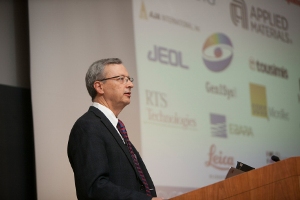Sep 23 2014
The latest and greatest scientific achievements at the nanoscale were on display at the 2014 Cornell NanoScale Science and Technology Facility (CNF) annual meeting, Sept. 18, which featured a lineup of speakers in materials science, biomedical engineering and more, and a research poster session and vendor show. Attendees also heard a brief update on the facility’s long-term future.
 Don Tennant, director of operations at the Cornell NanoScale Science and Technology Facility, welcomes users and gives an update on equipment upgrades and other improvements. Credit: Jason Koski/University Photography
Don Tennant, director of operations at the Cornell NanoScale Science and Technology Facility, welcomes users and gives an update on equipment upgrades and other improvements. Credit: Jason Koski/University Photography
Professor Marko Loncar of Harvard University’s School of Engineering and Applied Sciences kicked off the day’s presentations with the plenary lecture, “Diamond – Engineer’s Best Friend.” Loncar studies diamond nanophotonics and quantum optics, and he shared recent achievements in devices like ring resonators and nanowires made out of single-crystal diamond that exploit the material’s physical and chemical properties. Loncar’s devices can generate, manipulate and store optical signals at the single-photon level.
Throughout the day, attendees listened to the research accomplishments of more than a dozen Cornell speakers, as well as invited guests. Among Cornell’s presenters: Cheol-Joo Kim, postdoctoral associate in chemistry and chemical biology, on atomically thin, stacked graphene; Obafemi Otelaja, graduate student in materials science and engineering, on a microfabricated phonon spectrometer for probing phonon transport and scattering in silicon; and Mandy Esch, postdoctoral associate in biomedical engineering, on microfluidic cell culture devices for drug and toxicity testing.
In the past year, the four-decades-old Cornell facility’s long-term federal funding outlook has come into question due to uncertainty at the National Science Foundation about which universities should host a future national network of user facilities for nanofabrication. CNF’s leaders began the day briefing attendees on the ongoing discussion and assured them that the facility is “open for business” and here to stay.
Following a two-year NSF review for funding renewal after its 10-year grant period as a member of the National Nanotechnology Infrastructure Network had ended, CNF received word earlier this year that the NSF had declined to award a new grant to either of two proposing teams, said CNF Director Dan Ralph. The facility is operating on 18-month bridge funding while discussion continues and Cornell awaits a new call for proposals from the NSF. He thanked the many CNF users who have written to express support for CNF and its key role in advancing nanoscale science within their individual research programs.
Don Tennant, CNF director of operations, also gave updates on upgrades and additions to the facility’s equipment and capabilities, from advanced training videos to newly developed processes for optimized photoresists and materials etching processes.